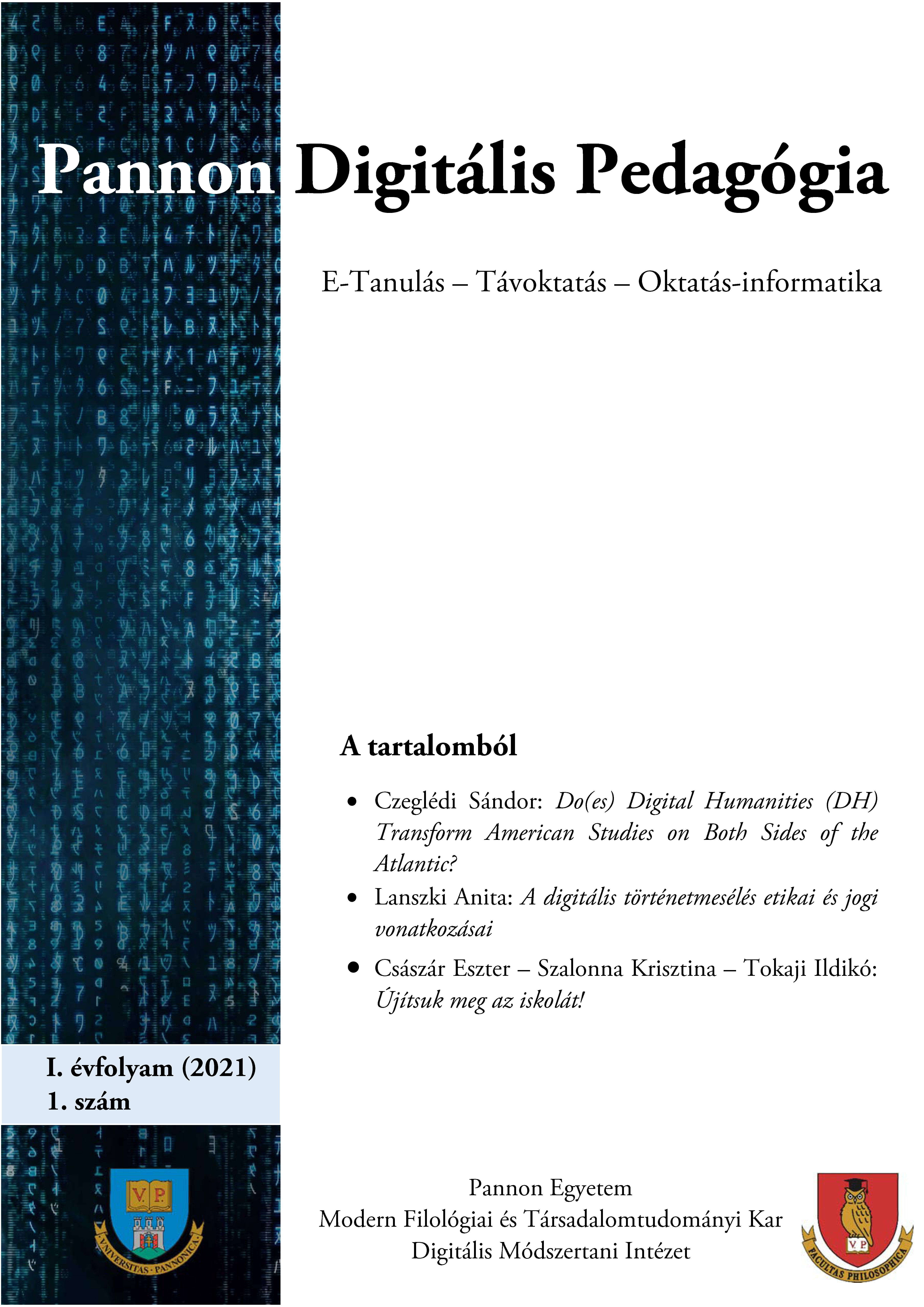Do(es) Digital Humanities (DH) Transform American Studies on Both Sides of the Atlantic?
DOI:
https://doi.org/10.56665/PADIPE.2021.1.2Kulcsszavak:
digitális bölcsészet; amerikanisztika; American Studies Association; European Association for American StudiesAbsztrakt
Annak ellenére, hogy a digitális bölcsészet modern kori gyökerei könnyedén visszavezethetők a második világháború utáni évekig, az oktatásügyi, szakmai folyóiratok (hasonlóan a szélesebb közönségnek szánt sajtótermékekhez) csupán alig több mint egy évtizeddel ezelőtt ismerték fel a területben rejlő potenciált. A túlfűtött várakozásokkal ellentétben a digitális bölcsészet mostanáig sem forradalmasította a humán tudományok kutatási-ismeretszerzési módszereit, bár hatása kétségkívül nem lebecsülendő. Jelen tanulmány az amerikanisztika tudományterületének vonatkozásában vizsgálja a digitális bölcsészet esetlegesen tetten érhető befolyását, górcső alá véve az egyesült államokbeli American Studies Association és a European Association for American Studies folyóiratait és konferenciatémáit. Az összevetés eredményeként kijelenthető, hogy a tengeren túlon a digitális bölcsészet hatása jóval jelentősebb az amerikanisztika berkein belül, ugyanakkor ez a befolyás legfőképpen a feminizmus és a kritikai rasszelmélet területeit érintő cikkek és előadások vonatkozásában érvényesül.
Hivatkozások
About the ASA. (2019). American Studies Association. Retrieved May 9, 2021, from https://www.theasa.net/
ASA Program Book: Session details. (2009). “Practices of Citizenship, Sustainability, and Belonging.” ASA Annual Meeting, Washington, D.C., November 5-8, 2009. Retrieved May 10, 2021, from https://asa.press.jhu.edu/program09/sunday.html
Berry, D. M. (2019, February 13). What are the digital humanities? Retrieved May 7, 2021, from https://www.thebritishacademy.ac.uk/blog/what-are-digital-humanities/
Berry, D. M., & Fagerjord, A. (2017). Digital humanities: Knowledge and critique in a digital age. Cambridge, UK: Polity Press. E-book.
Boyden, M. (2013, February 5). Review of the book Transcendental Resistance: The New Americanists & Emerson’s Challenge, by J. Voelz. European Journal of American Studies, http://journals.openedition.org/ejas/9984
Brennan, T. (2017, October 15). “The Digital-Humanities Bust.” Review. The Chronicle of Higher Education. Retrieved May 4, 2021, from https://www.chronicle.com/article/the-digital-humanities-bust/
Broemeling, L. D. (2011). An Account of Early Statistical Inference in Arab Cryptology. The American Statistician, 65(4), 255-257. https://www.jstor.org/stable/23339552
Buurma, R. S., & Heffernan, L. (2018, April 11). Search and Replace: Josephine Miles and the Origins of Distant Reading. Retrieved May 07, 2021, from https://modernismmodernity.org/forums/posts/search-andreplace
Caucuses. (2019). American Studies Association. Retrieved May 9, 2021, from https://www.theasa.net/communities/caucuses
Czeglédi, S. (2021). “Identity Politics: A Mixed Blessing or an Outright Curse?” In J. Tóth (Ed.), Értékmentő és értékteremtő humán tudományok. Budapest: Akadémiai Kiadó. https://doi.org/10.1556/9789634545767
Deacon, D. (2017). “Some Unholy Alloy”: Neoliberalism, digital modernity, and the mechanics of globalized capital in Cormac McCarthy’s The Counselor. European Journal of American Studies, 12(3). doi:10.4000/ejas.12364
Deloria, P. J., & Olson, A. I. (2017). American studies: A user's guide. Oakland, CA: University of California Press.
Digital Humanities Caucus. (2019). American Studies Association. Retrieved May 7, 2021, from https://www.theasa.net/communities/caucuses/digital-humanities-caucus
EAAS 20/20 Vision. (2021). “20/20 Vision: Citizenship, Space, Renewal.” Warsaw, Poland, April 30-May 2, 2021. Retrieved May 10, 2021, from http://eaas2020.eu/wp-content/uploads/2021/04/EAAS%202021%20-%20program.pdf
EAAS Digital Studies Network. (2021). European Association for American Studies. Retrieved May 9, 2021, from https://www.eaas.eu/eaas-networks/643-eaas-digital-studies-network
EBAAS. (2018). The Joint 32nd European Association for American Studies & 63rdBritish Association for American Studies Conference. London, UK, April 4-7, 2018. Retrieved May 10, 2021, from https://ebaas2018.files.wordpress.com/2018/02/ebaas-2018-conference-programme-26-01-18.pdf
Gold, M. K., & Klein, L. F. (2019). Introduction: A DH That Matters. In M. K. Gold & L. F. Klein (Authors), Debates in the digital humanities 2019. Minneapolis, MN: University of Minnesota Press. https://dhdebates.gc.cuny.edu/read/4805e692-0823-4073-b4315a684250a82d/section/0cd11777-7d1b-4f2c-8fdf-4704e827c2c2#intro
Gold, M. K., & Klein, L. F. (2016). Digital Humanities: The Expanded Field. In M. K. Gold & L. F. Klein (Eds.), Debates in the digital humanities 2016 (pp. ix-xv). Minneapolis: University of Minnesota Press.
Gold, M. K. (ed.) (2012). Debates in the digital humanities. Minneapolis, MN: University of Minnesota Press. Google Books Ngram Viewer. (n.d.). Retrieved May 07, 2021, from https://books.google.com/ngrams
Heppler, J. A. (2015). What is digital humanities. Retrieved May 07, 2021, from https://whatisdigitalhumanities.com/
Kahn, D. (1973). The codebreakers: The story of secret writing. New York, NY: Macmillan.
Keeling, K., & Kun, J. (2011). Introduction: Listening to American Studies. American Quarterly, 63(3), 445-459. doi:10.1353/aq.2011.0037
Kirschenbaum, M. (2012). What Is Digital Humanities and What’s It Doing in English Departments? In M. Gold (Ed.), Debates in the digital humanities (pp. 3-12). Minneapolis: University of Minnesota Press.
Lipsitz, G. (2015, April). What Is American Studies? ASA Working Papers. Retrieved May 08, 2021, from https://www.theasa.net/sites/default/files/What_is_American_Studies.pdf.
Liu, A. (2016). Is Digital Humanities a Field? An answer from the point of view of language. Journal of Siberian Federal University. Humanities & Social Sciences, 9(7), 1546-1552. doi:10.17516/1997-1370-2016-9-7-1546-1552
Oppermann, M. (2016). History of American Studies: From its emergence to transnational American Studies. In A. Dallman, E. Boesenberg, & M. Klepper (Eds.), Approaches to American cultural studies (pp. 13-22). London: Routledge, Taylor & Francis Group.
Resources. (2019). Digital Humanities Caucus. American Studies Association. Retrieved May 08, 2021, from https://www.theasa.net/communities/caucuses/digital-humanities-caucus/resources
Roberto Busa Prize. (n.d.). Retrieved May 07, 2021, from https://adho.org/awards/roberto-busa-prize
Paul, H. (2014). The myths that made America: An introduction to American studies. Bielefeld: Transcript. Saturday's schedule. (2002). “The Local and the Global & Recovery Project/Redefining ‘Nuestra América.’” ASA Annual Meeting, Houston, TX, November 14-17, 2002. Retrieved May 10, 2021, from https://asa.press.jhu.edu/program02/saturday.html
Schedule: Friday. (2000). “American Studies in the World/The World in American Studies.” ASA Annual Meeting, Detroit, MI, October 12 15, 2000. Retrieved May 10, 2021, from https://asa.press.jhu.edu/program00/friday.html
Sennyey, P. (2018). Viták és víziók a digitális bölcsészetről. Digitális Bölcsészet, 1, 111-120. https://doi.org/10.31400/dh-hun.2018.1.228
So, R. J. (2021). Introduction: Contemporary culture after data science. Journal of Cultural Analytics, 4, 39-47. doi:10.22148/001c.22335
Stephens, J., & Bonner, S. J. (2018). American Studies Association. In Encyclopedia of American Studies online. Johns Hopkins University Press. https://easref.press.jhu.edu/view?aid=849&from=search&query=digital%20humanities&link=search%3Freturn%3D1%26query%3Ddigital%2520humanities%26section%3Ddocument%26doctype%3Dall
Sula, C. A., & Hill, H. V. (2019). The early history of digital humanities: An analysis of computers and the Humanities (1966–2004) and literary and linguistic computing (1986–2004). Digital Scholarship in the Humanities, 34(1), 190-206. doi:10.1093/llc/fqz072
Tilton, L., Earhart, A. E., Delmont, M., Garfinkel, S., Karlsberg, J. P., & David Nieves, A. (2018). Introduction: American Quarterly in the digital sphere. American Quarterly, 70(3), 361-370. doi:10.1353/aq.2018.0026
Voyant Tools. (n.d.). Retrieved May 09, 2021, from https://voyant-tools.org/
Yoshihara, M. (2018). Editor's note. American Quarterly, 70(3), vii-viii. doi:10.1353/aq.2018.0025
Letöltések
Megjelent
Verziók
- 2023-01-17 (2)
- 2021-09-10 (1)

